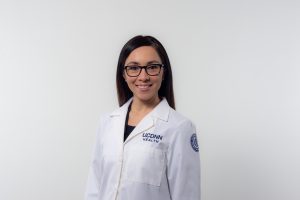For parents of children with special health care needs, a routine trip to the dentist can be a daunting task. Faculty in the division of pediatric dentistry, assistant professor Dr. Katherine Fleming and assistant professor Dr. Rosa Pelaez- Shelton, share the top tips to help parents of children with special health care needs ensure that their child’s smile stays healthy and bright.
Establish a dental home

A dental home is a relationship with a dental office through which your child has one dental provider that they regularly see. Your child will get to know their dentist, dental hygienist, and dental staff so that they feel safe and comfortable with dental visits. It also helps you ensure that your child has regular comprehensive care. Finally, a dental home is vital in case of any dental questions or emergencies; you will always know who to call.
Speak with the office prior to the visit to provide all necessary information
Make sure all your paperwork is completed beforehand. Share any and all important medical, dental, social and behavioral details with the office before you arrive. Providing this information ahead of time allows your dental provider to review and be prepared for the visit. Depending upon your child’s history, your provider may want to consult and connect with your child’s other medical providers and specialists. Share contact information so that everyone can work together as a team.
Set everyone up for success when scheduling

Typically, children (and most adults!) are fresher in the morning. Schedule your child for the first visit of the day if possible. This will help ensure that your child is not tired or hungry at the end of a long school day. Additionally, the waiting room will be quieter and emptier first thing in the morning. Usually there is a shorter likelihood of wait for the first appointment as well. Choose a day when your child does not have any other stressful appointments or events planned.
Tell us about your child
You know them best. Do they have a favorite song we can play? Do they prefer dimmed lighting for comfort? Do they have a favorite character we can chat about? These details can make all the difference in making your child feel comfortable and at home in the dental office.
Prepare your child for the visit
Check out books or videos that show a positive dental experience and prepare your child. Start a few weeks before and share them multiple times with your child before their visit. Try to stay upbeat and positive as you talk about his/her upcoming dental visit. Your dental office might also provide you with a social story that shows what to expect at each step of your child’s dental visit. Multiple dental office social stories are also available online.
Bring comfort items
Does your child have a favorite toy, stuffed animal, blanket, or other comfort item? Always confirm with the office but most dental practices are happy for you to bring in something familiar for your child to hold during their visit.
Understand that it might be a process
Sometimes it takes multiple visits for any child to feel comfortable at the dental office and this is okay. We love to celebrate each victory as children become more accustomed to the experience. Additionally, some children might feel such fear and anxiety regarding dental care that other options, such as sedation, could be the best choice if they need extensive dental care. Collaborate with your dental team to find what works best for your child and your family.
Bring any questions you have
Would you like recommendations for a particular flavor of toothpaste? Do you need suggestions on how to position yourself when brushing your child’s teeth? Do you have any questions about the treatment plan? Write down questions as they come up to discuss with your provider at this visit. That’s what we’re here for!
You can be a positive influence
Children tend to be influenced by our own display of fear and anxiety. Remaining calm during the appointments can influence positive behavior. We can also help them by using less-threatening language and not discussing unpleasant past experiences in front of them. Your dental provider can share with you some child-friendly words to describe dental instruments, equipment and procedures.



